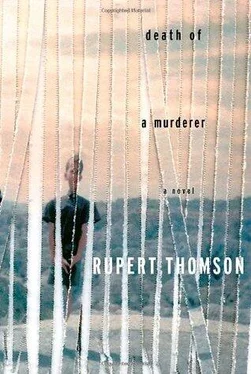Raymond lay quite still for a few seconds, then opened his eyes and shouted, “Thief!”
At first Billy thought he must be joking — it was Raymond’s sense of humour exactly — but then he saw the fear and hostility in Raymond’s eyes, and in that moment he had the feeling that he didn’t know Raymond at all, that the two of them had never met before and that he had, in fact, attacked and robbed a total stranger.
Raymond shouted the word again, in French this time, and Billy stared in disbelief as Raymond sat up and pointed an accusing finger. Passers-by were looking at Billy now, and at the money in his hand; some of them seemed to be about to intervene. Snatching up his rucksack, Billy started running.
That night he ate by himself, and the old couple who owned the bistro let him sleep in a small room next to the kitchen. The following morning he caught the ferry to Dover. He was home by midnight. He didn’t see Raymond again for years.
For the last few minutes he’d had the sense that he was being watched. A light sweat broke out on his forehead as he remembered the figure in the hospital grounds, and how her gaze had seemed to linger on him even after he had moved away, into the trees; there had been a kind of weight to it, as if her eyes were thumbs and they were being pressed into his back. Warily, he glanced over his shoulder. Sitting behind him, two tables away, was an Asian man in a dark-grey suit and an open-necked blue-and-white-striped shirt. Although the man appeared to be staring downwards at his hands, which were resting on the table, Billy still felt as if he was being scrutinised. Facing the corridor again, he started on another sandwich. He now knew what he should have said to Raymond in that pub in Cheshire. I still owe you forty francs. That might have put paid to his irritating smile.
A staff nurse walked past, jingling a bunch of keys. Billy was about to open his newspaper when the Asian man finally spoke.
“You’re guarding that woman, I suppose…”
The man’s voice was genial, and a little careworn, but it had no false notes in it. Clearly, he was no threat to security. Billy turned in his chair. The man was still looking at his hands.
Billy adopted the same innocuous tone. “That’s right. I’m on duty all night. A twelve-hour shift.”
Only now did the man look up. There was a pale cast across one of his eyes, as if candlewax had been smeared over the iris. “You work hard,” he said.
“Pretty hard. What line of business are you in?”
“Hi-fi. I own a couple of shops.”
“I’ve had the same system for twenty years. Ever since I joined the force.”
“Come to me,” the man said. “I’ll upgrade you.”
“I probably wouldn’t be able to afford it.”
“I’ll give you a special price.”
The two men smiled at each other.
Billy raised his can of Fanta to his lips and drained it. “So what brings you here?”
“My wife’s having an operation tonight.”
“Nothing too serious, I hope.”
The man looked away for the first time, his eyes moving across the cafeteria. “I don’t know. Something to do with her bowel.”
“I hope she comes through it all right,” Billy said.
“Thank you,” the man said. “Me too.”
There was a silence during which he appeared to be trying to decide whether or not to go further, and Billy glanced down at his paper. In interviews he often used this technique. If you stepped back, it had the effect of allowing the other person to come forwards, almost involuntarily, and occupy the space you’d just vacated. It was one of the more subtle methods of eliciting a confession.
“I have been listening to Mozart,” the man said.
Billy sat sideways on his chair, one forearm resting on the back. This wasn’t what he had expected.
“Do you listen to classical music?” the man asked.
“Not much.”
“I listen to Mozart,” the man went on, “and I have trouble understanding how someone could have thought of something so beautiful. I try to imagine the world before that music came into being, and then I try to imagine someone creating it from nothing — all those sounds…Impossible.” He shook his head and then allowed himself a brief sad smile. “And yet it’s just as impossible to imagine the world without that music in it.”
Billy watched the man carefully, but said nothing. One of the vending-machines behind him shuddered and then fell silent.
“If something should happen to my wife…” Forearms still lying flat on the table, the man’s hands lifted off the surface and then dropped back again. He had come as close as he dared to saying what he wanted to say.
Billy looked up as an elderly woman in a pink dressing-gown hobbled past. Noticing him, she raised one fragile fist and shook it in the air beside her ear. I’m giving it everything I’ve got, she was telling him. I’m not bloody going quietly.
“There are things we don’t understand,” the man said, staring at his hands again. “This woman that you’re guarding, for instance. The things she did…”
Billy made sure that the wariness he now felt didn’t reach his face.
“What do you think about that?” the man asked.
“I try not to think. I just do my job.”
“But thoughts still occur to you,” the man said seductively, “despite yourself.”
Rather than express an opinion of his own, Billy fell back on the conversation he’d had with Phil a few hours earlier. “I never met the woman,” he said. “A colleague of mine met her, though, on several occasions, and he told me that it was difficult to connect the things she did then with the woman he saw in front of him.”
The man nodded slowly. “Perhaps it was difficult for her too.” He paused. “Even at the time it was difficult, perhaps…”
“Yes, perhaps,” Billy said. “But you or I would never go so far.”
“Wouldn’t we?” The man’s good eye seemed gentle, as though it were contemplating another, far more selfless world, while his damaged eye, by contrast, had a critical, even accusatory gleam to it. “Who really knows how far we would go,” he said, “if the circumstances were right?”
They both fell quiet again. In a nearby ward a man laughed — or it could have been a cough.
“If you were in love, for example,” the man said. “Not ordinary love. A love that takes you over, turns you upside-down. An absolute dependency. A kind of trance.”
Billy thought of Venetia and her father, their two faces overlapping, merging into one. He felt unsteady, giddy. He felt as if the world was accelerating away from him in all directions. At the same time, everything had remained exactly where it was.
“The things she did,” the Asian man went on, “they weren’t natural to her — not at the beginning, anyway. They became natural, though.”
“You don’t know that,” Billy said. “You’re just guessing.”
He had assumed that the man would argue the point, but the man just looked at him and said, “Of course.”
At that moment, Phil appeared with two other men, one of whom was a detective inspector. They were so deep in conversation that they didn’t notice Billy, but the mere fact of their presence prompted him to glance at his watch. Eight minutes to one.
Rising to his feet, he wrapped his last remaining sandwich in silver foil and tucked it into his bag. “I have to get back to work, I’m afraid.”
The man reached into his jacket pocket, brought out a card and handed it to Billy. “My name is Vijay Prabhu. If you’re ever looking for some new equipment…” His smile told Billy that he needn’t take the offer too seriously: he had simply wanted something tangible to pass between them.
Читать дальше












